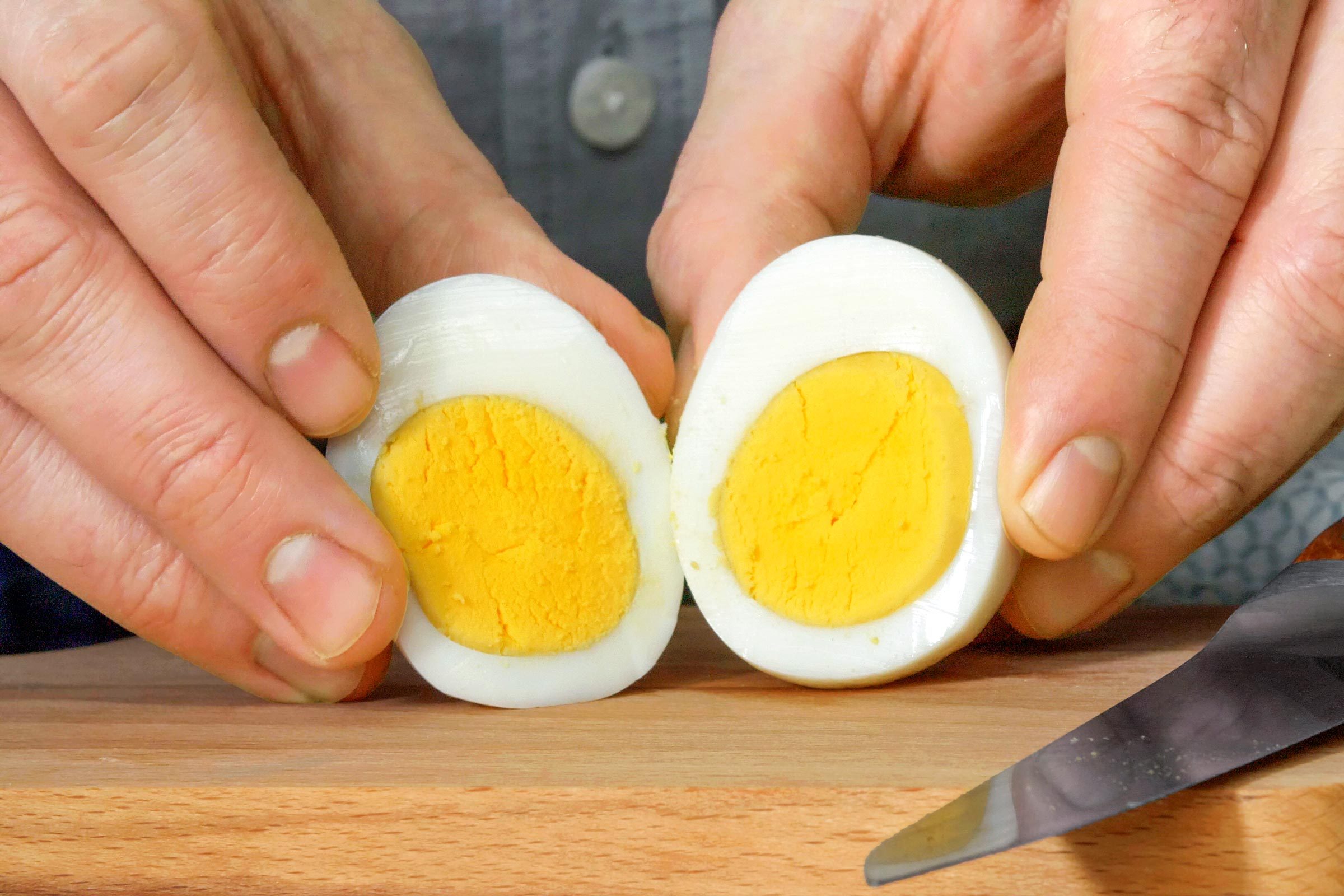Fresh eggs last up to 5 weeks in the fridge. Hard-boiled eggs last about a week when refrigerated.

Understanding egg shelf life is crucial for food safety and quality. Fresh eggs, boiled eggs, and hard-boiled eggs have different storage durations. Fresh eggs can last up to five weeks in the fridge. Boiled eggs, once cooked, should be eaten within a week.
Proper storage ensures you enjoy eggs at their best. Keeping eggs in their carton helps maintain freshness and prevent contamination. Always check for any off smells or unusual appearances before consumption. These simple guidelines can help you make informed decisions about your egg usage. This ensures both delicious meals and a safe kitchen environment.
Egg Freshness Factors
Eggs are a staple in many households. Knowing their shelf life is essential. This section covers the factors affecting egg freshness.
Purchase Date
The purchase date is crucial for egg freshness. Always check the date on the carton. Fresher eggs last longer in the fridge. Use eggs within three weeks of purchase for best quality.
Storage Conditions
Proper storage conditions can extend egg shelf life. Keep eggs in their original carton. Store them in the coldest part of the fridge. Avoid placing eggs on the fridge door. The door temperature fluctuates, affecting egg freshness.
| Storage Condition | Fresh Eggs | Boiled Eggs | Hard-Boiled Eggs |
|---|---|---|---|
| Refrigerated | 3-5 weeks | One week | 1 week |
| Room Temperature | 2 hours | 2 hours | 2 hours |
Also, consider these tips:
- Keep eggs away from strong odors.
- Avoid washing eggs before storage.
- Use airtight containers for boiled eggs.
Proper storage ensures your eggs stay fresh and safe to eat.
:max_bytes(150000):strip_icc()/GettyImages-648875556-2000-a1871a00403f4568933b06f55213a7c6.jpg)
Credit: www.allrecipes.com
Signs Of Fresh Eggs
Understanding the signs of fresh eggs is essential for ensuring food safety. Fresh eggs are healthier and taste better. Here, we will discuss identifying fresh eggs based on their appearance and smell.
Appearance
A fresh egg has a clean, smooth shell. The shell should be free from cracks and dirt. When cracked open, the egg white should be thick and close to the yolk. The yolk should be round and firm. Check for this visual cue to know the egg’s freshness.
| Characteristic | Fresh Egg |
|---|---|
| Shell | Clean, smooth, no cracks |
| Egg White | Thick and close to yolk |
| Yolk | Round and firm |
Smell
Fresh eggs do not have a strong smell. If the egg smells terrible, it is not fresh. A sour or sulfuric smell is a clear sign of spoilage. Always sniff the egg after cracking it open. This simple step can prevent foodborne illnesses.
Shelf Life Of Fresh Eggs
Have you ever wondered how long your eggs are safe to eat? Understanding the shelf life of fresh eggs is crucial. It ensures you enjoy eggs of the best quality.
Refrigerated
Storing eggs in the fridge keeps them fresh longer. Fresh eggs can last up to five weeks when kept in the refrigerator. This is because the cold temperature slows down bacterial growth.
| Storage Method | Shelf Life |
|---|---|
| Refrigerated | Up to 5 weeks |
Room Temperature
Eggs kept at room temperature spoil faster. They can last up to two weeks on the counter. Room temperature storage is less ideal. It promotes bacteria growth.
| Storage Method | Shelf Life |
|---|---|
| Room Temperature | Up to 2 weeks |

Credit: www.tasteofhome.com
Boiled Eggs In The Fridge
Boiled eggs are a convenient and nutritious snack. Storing them correctly in the fridge is essential. This ensures they stay fresh and safe to eat.
Preparation
For the best results, start with fresh eggs. Follow these steps:
- Place the eggs in a pot.
- Cover them with cold water.
- Bring the water to a boil.
- Once boiling, turn off the heat.
- Let the eggs sit in hot water for 10-12 minutes.
- Transfer the eggs to a bowl of ice water.
- Let them cool for 5 minutes.
After cooling, peel the eggs if desired. Now, they are ready for storage.
Storage Tips
Proper storage of boiled eggs is critical to their shelf life. Follow these tips:
| Storage Method | Recommended Time |
|---|---|
| Unpeeled boiled eggs | Up to 7 days |
| Peeled boiled eggs | Up to 5 days |
- Keep boiled eggs in a covered container.
- Label the container with the boiling date.
- Place the container in the coldest part of the fridge.
- Avoid storing boiled eggs in the fridge door.
By following these tips, your boiled eggs will stay fresh and safe to eat.
Shelf Life Of Boiled Eggs
Boiled eggs are a popular and versatile food. They can be eaten alone or added to various dishes. It’s essential to know the shelf life of the fridge. This helps to ensure they remain safe to eat.
In Shell
Boiled eggs left in their shell last longer. They can stay fresh for up to one week. To store them properly, keep them in the refrigerator. Please place them in a clean, dry container. This helps to maintain their freshness.
It’s also helpful to label the container with the boiling date. This way, you can track their age easily.
Peeled
Peeled boiled eggs have a shorter shelf life. They can last up to three days in the fridge. To store them, put them in a sealed container. Add a damp paper towel to keep them moist.
Make sure to check them for any signs of spoilage before eating. This ensures they are still good to consume.
| Type of Boiled Egg | Shelf Life in Fridge |
|---|---|
| In Shell | Up to 1 week |
| Peeled | Up to 3 days |
Understanding the shelf life of boiled eggs helps keep your food safe. Follow these guidelines for the best results.
:max_bytes(150000):strip_icc()/how-to-store-hard-boiled-eggs-0922-2000-18d486445378451aa8d276675fa20cb9.jpg)
Credit: www.marthastewart.com
Hard-boiled Eggs Basics
Hard-boiled eggs are a versatile and nutritious snack. They are perfect for salads, sandwiches, or just eating on their own. But, making the perfect hard-boiled egg requires some know-how. Let’s break down the basics to help you achieve the best results.
Cooking Time
Cooking time is crucial for hard-boiled eggs. Overcooking can result in a greenish yolk and a rubbery texture.
- For soft-boiled eggs, cook for 6-7 minutes.
- For medium-boiled eggs, cook for 8-10 minutes.
- For hard-boiled eggs, cook for 11-12 minutes.
Always use a timer to ensure accuracy. Place the eggs in a single layer in the pot. Cover them with at least an inch of water. Bring the water to a rapid boil. Then, reduce the heat to a simmer and start your timer.
Cooling Process
Cooling the eggs immediately after boiling is essential. It stops the cooking process and makes peeling easier.
- Prepare a bowl of ice water.
- Once the eggs are done, transfer them to the ice water.
- Let them sit in the ice water for at least 10 minutes.
Once cooled, gently tap the eggs on a hard surface to crack the shells. Start peeling from the larger end where there’s an air pocket. This makes peeling easier and keeps the egg intact.
Store the peeled eggs in an airtight container in the fridge. They can last up to one week.
By following these steps, you can enjoy perfect hard-boiled eggs every time.
Extending Egg Shelf Life
Understanding how to extend the shelf life of eggs is crucial. Fresh, boiled, and hard-boiled eggs all have different storage needs. Proper handling and storage practices can help keep your eggs fresh longer.
Proper Handling
Proper handling is key to keeping eggs fresh. Handle eggs with clean hands to avoid contamination. Avoid dropping or cracking eggs, which can introduce bacteria.
- Wash hands before and after touching eggs.
- Check eggs for cracks before buying.
- Store eggs in their original carton to protect them.
Best Storage Practices
Storing eggs correctly can greatly extend their shelf life. Fresh eggs can last 3-5 weeks in the fridge. Boiled eggs last up to one week. Hard-boiled eggs, if peeled, last about two days.
| Type of Egg | Storage Time (Fridge) |
|---|---|
| Fresh Eggs | 3-5 weeks |
| Boiled Eggs | Up to 1 week |
| Hard-Boiled Eggs (Peeled) | About 2 days |
Keep eggs in the coldest part of the fridge. Avoid storing them in the fridge door, which is warmer. Use a sealed container for peeled hard-boiled eggs to keep them fresh.
Safety Precautions
When storing eggs, understanding the necessary safety precautions is crucial. This ensures that you and your family stay safe and healthy. Whether you have fresh, boiled, or hard-boiled eggs, following these guidelines can help maintain their quality and safety.
Checking Freshness
To check the freshness of your eggs, you can use a simple water test. Fill a bowl with water and gently place the egg in it.
- If the egg sinks and lays flat, it is fresh.
- If it stands upright or floats, it is old.
This test works because fresh eggs have less air inside. An older egg has more air, making it float.
Avoiding Contamination
Preventing contamination is key to keeping your eggs safe. Always store eggs in their original carton. This protects them from absorbing strong odors and flavors from other foods.
Keep your eggs in the coldest part of the fridge. Do not store them on the fridge door. This area experiences temperature fluctuations, which can reduce the shelf life.
When handling eggs, always wash your hands before and after. This prevents the transfer of bacteria. Also, clean any surfaces and utensils that come into contact with raw eggs.
Follow these safety precautions to ensure your eggs are always safe to eat.
Frequently Asked Questions
How Long Do Farm Fresh Hard-boiled Eggs Last in the Fridge?
Farm fresh hard-boiled eggs last about one week in the fridge. Store them in an airtight container for freshness.
Can You Eat Hard-boiled Eggs After 10 Days?
Yes, you can eat hard-boiled eggs after 10 days if they have been properly refrigerated. Always check for any off smells or unusual textures.
Do Fresh or Hard-boiled Eggs Last Longer?
Fresh eggs last longer than hard-boiled eggs. Fresh eggs can last up to 5 weeks in the fridge. Hard-boiled eggs, when refrigerated, should be consumed within one week for optimal freshness and safety.
How Long Does a Boiled Egg Last in the Fridge?
A boiled egg lasts up to one week in the fridge. Store it in a covered container for freshness.
Conclusion
Understanding egg shelf life is crucial for safety and taste. Fresh, boiled, and hard-boiled eggs have different storage times. Store them properly to enjoy their best quality. Always check for signs of spoilage before consumption. By following these guidelines, you can ensure your eggs remain safe and delicious.


GIPHY App Key not set. Please check settings